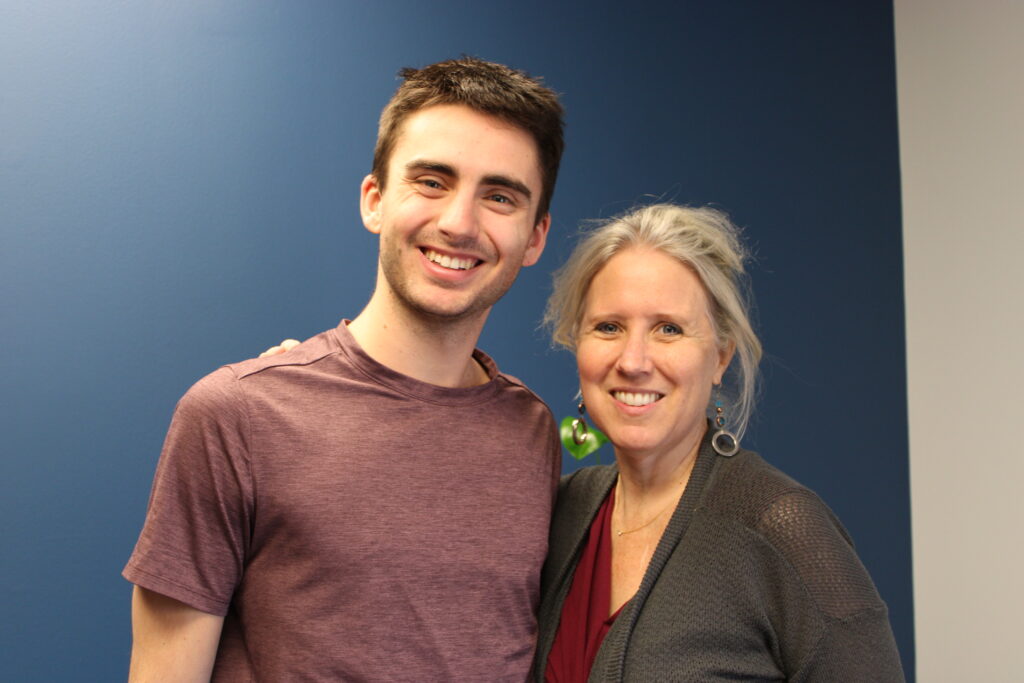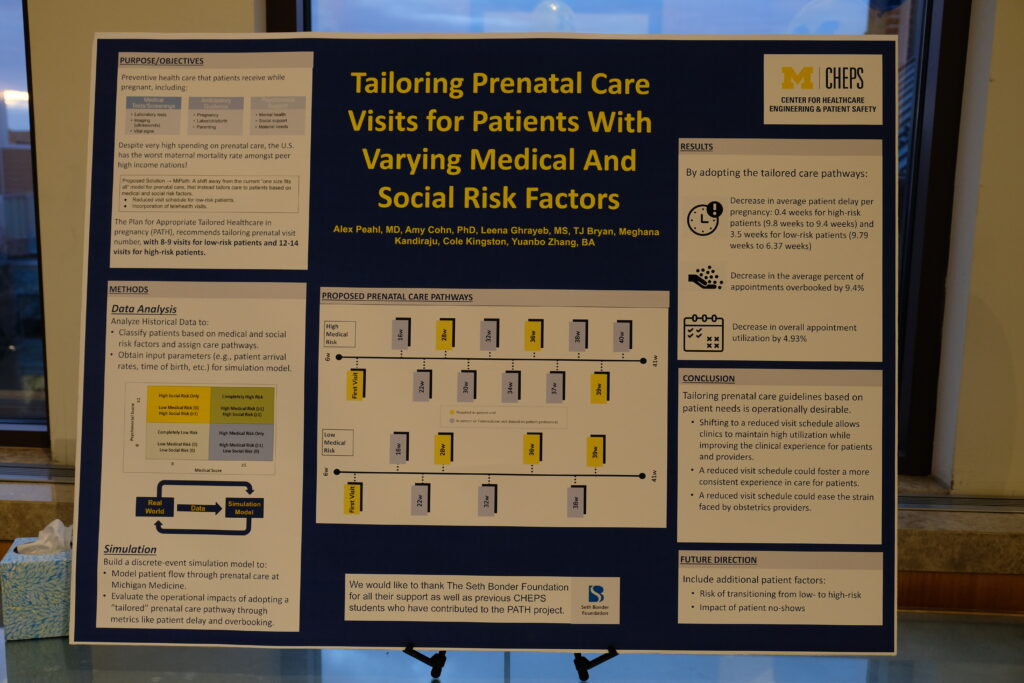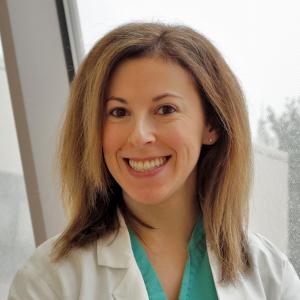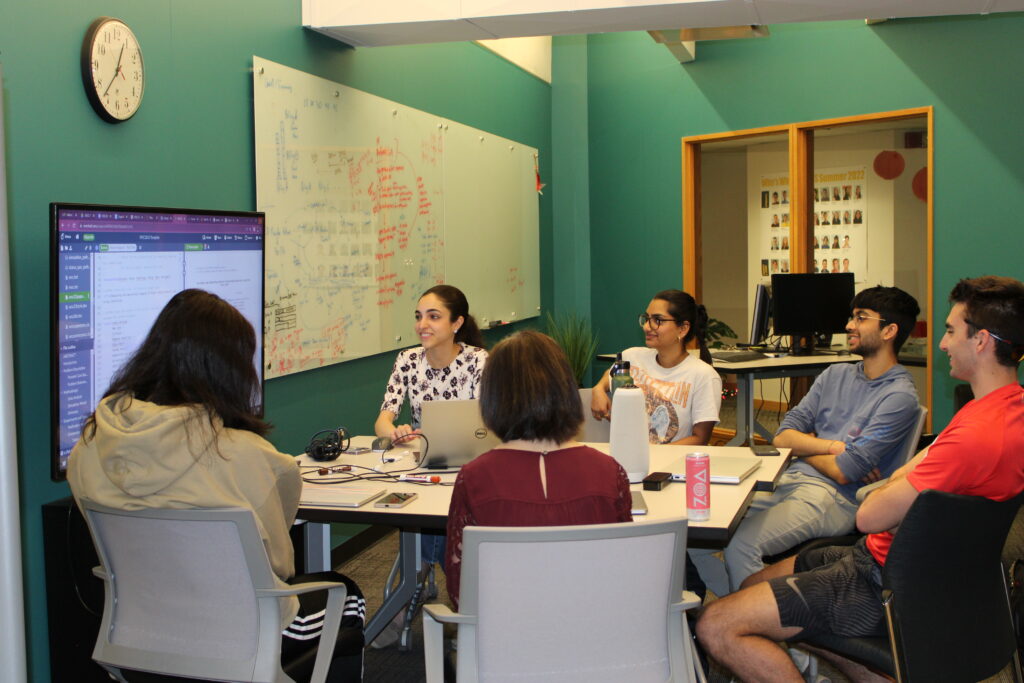TJ Bryan, a University of Michigan senior majoring in Industrial Operations Engineering, has a lot to look forward to—his April graduation, his May wedding, and soon, his big move to Orange County, California. Having been with CHEPS since May 2022, he recently reflected on the most meaningful part of his experience as an undergraduate researcher: the people.

Supportive Staff
“I started at CHEPS because of Amy,” TJ said, referring to Dr. Amy Cohn, the Faculty Director of CHEPS and Chief Transformation Officer of Michigan Medicine. “Amy was definitely one of, if not my favorite, professors that I’ve had…she was very enthusiastic about what she did.” Having already shared information about her role at CHEPS throughout the semester, she invited TJ to interview for a student research position one day after IOE 310: Optimization and Computational Methods. Seeing his capability, she invited him aboard. “I went with CHEPS, and ever since it’s been a great experience.”
Amy often acts as a sort of magnet, drawing incredible minds to the group and helping them effect impactful change for patients and clinicians alike. Such was the case with Billy Pozehl, the Research Area Specialist who transitioned from student to staff member in 2015 and has been a pillar of CHEPS ever since. Perhaps one of the reasons Amy is able to so quickly identify CHEPSters before they are CHEPSters is that she consistently looks for the best in people.
According to TJ, Amy “highlights everyone’s strengths rather than weaknesses, which she either fills in herself or gets someone else to fill in. I think that’s the kind of mindset you take at CHEPS. If there’s an area where you can help out and it’s one of your strengths, then that’s where you’re going to help out. That’s the kind of environment Amy’s set up, and all of the advisors, mentors, and staff take that approach.” TJ named both Billy and Christy Linebaugh, the Program Director at CHEPS, as two staff members who especially maintain a supportive tone around the office. “And when that tone is set from the top, it really does trickle down the system.”
But CHEPS staff members aren’t the only ones who nurture student researchers’ education; collaborators from Michigan Medicine also offer invaluable guidance.

Learning From the (Leaders and) Best
TJ operates as an integral member of the PATH project, which is formally titled “Rightsizing Prenatal Care: Using Pregnancy Risk Factors to Guide Prenatal Services.” The project utilizes data analysis and simulation to modulate appointment frequency for pregnant folks. While one may assume that the more doctor’s visits a patient has, the better, research reveals that too many visits can actually become harmful, as the resulting medical stress may increase a patient’s risk of preeclampsia and other complications. Too few visits, however, and the patient risks any potentially underlying conditions going un(der)treated. The universal goal is safe birth and healthy babies, yet the path to that goal is dependent on each patient’s individual needs.
“There are all of these little rabbit holes that could cause issues during pregnancy, and we look at how each of those could affect our patients and how we could help that in optimizing the [number of appointments] they need to have,” said TJ. To him, this project has been utterly fulfilling. “We got the opportunity to actually go into the clinic…being able to see who we’re actually affecting, the lives that we’re touching in doing this work, it’s really cool. Most of school is all theoretical, right? It’s like, ‘Well, look at this story problem that was made up by professors and build through a solution.’ And these are real people, real lives, real babies that you’re working to help.”

Leading the in-hospital charge in this work is Dr. Alex Peahl (left), MD, MSc, who externally sponsors the PATH project. When Dr. Peahl started at Michigan Medicine in 2018, she was selected for the National Clinician Scholars Program. The program emphasizes mentorship and research in medicine. Dr. Peahl fully embraces these values, both through her work as a clinical lecturer in Obstetrics and Gynecology and her collaboration with CHEPS.
“She does a lot of awesome work, and we’ve gotten to get really close with her,” TJ shared. “She’s very personable and she really does invest time in students. She’s had us over to her own home multiple times at this point, and it’s been a great experience just having the opportunity to go into her clinic.” It’s apparent that for the medical practitioners collaborating with CHEPS, the best way to help patients is to help students, as well. As preventative medicine continues to grow in priority across the country, the initiative to invest in the education of tomorrow’s healthcare leaders grows in priority as well.
“Dr. Peahl takes this work very seriously, and it’s very personal to her. And when the lead of a project—the sponsor of a project—takes that personable approach, it helps for everyone else on the team to really put some effort into it.”
At CHEPS, this effort is apparent at every turn.
Bringing the Collaborative Energy
TJ recognized that “You have a lot of people at CHEPS who have very busy schedules. It’s easy to get down on how much work you have to get done, and so making sure you bring energy to the office is definitely something that’s essential. It’s very contagious, and without that energy, you’re not going to get a lot of stuff done.” Getting stuff done is exactly what CHEPS is all about. After all, the center exists for the sole purpose of solving healthcare challenges in real time. With 10-14 active projects occurring at once, time management and optimization are paramount. Someone close to TJ once told him that “you’ll make time to do the things you want to do,” and it’s obvious that TJ and his colleagues want to do this work. “It’s honestly just an attitude thing. How you approach problems, how you approach anything. Someone who comes in with a smile versus someone that comes in all stressed out and visibly aggravated…the room completely changes. I think that’s something that’s been emphasized at CHEPS and something that the students have done a really nice job of supporting.”

Still, logistics can be challenging. Speaking again about the PATH project, TJ shared that “Last semester, we definitely had a lot of people who had to work remotely at times just because of school schedules…Trying to get all that figured out was a little difficult, so we really had to work together and say, ‘Hey, you’re going to have to be self-disciplined to make sure you’re getting this stuff done,’ and communicating that thoroughly with everyone on the team to make sure that we’re making strides forward.” Through hard work, the group successfully navigated schedules and distance, advancing their life-bettering research and publishing two abstracts. “Our team came together. We really collaborated well,” TJ said with a smile. “I mean, I’m a little biased, but I think the PATH team is probably one of the strongest teams at CHEPS. It’s a good group.” In a high-pressure situation with a hard deadline—April 29th, graduaton day—CHEPSters have stepped up to the plate and delivered.
When asked how working alongside non-IOE students has impacted him, TJ spoke highly of how he has learned from other kinds of engineers. His peers studying computer science, for example, have helped him “get a little more hands-on with the coding aspects of the projects” they work on. But those who have been most helpful to him, he stated, are his fellow PATH team members Leena and Yuanbo.
“Leena has been a great person to have as a mentor. She is very organized, very good at putting a team together and having everyone’s qualities [highlighted]. It’s so unique and something that I really appreciate.” Of Yuanbo, TJ said, “She’s getting her master’s and she has a lot of experience that I’ve gotten to learn from. She’s given me different avenues of thinking for how to look at data and approach it.” CHEPS is a team-oriented environment combining scholars at all stages in their careers and education. “Having the opportunity to work with people with more experience in education has been really helpful.”
Forever Go Blue
With only a week or so left in Ann Arbor, TJ will long remember the supportive relationships he’s forged while working at CHEPS. To him, CHEPS is “more than just the research. It’s a safe space for students. People are looking out for each other, which is very unique. And I think the success of that mindset is pretty apparent.”
— Written by Hannah Buck, CHEPS Staff
